
Recently on Cyclingnews.com |
An interview with Robbie McEwen, July 5, 2006, part 2
Part 1 of this interview is here.
Robbie McEwen: life of a sprinter
Top sprinter Robbie McEwen is already a stage winner in this year's Tour. He continues his interview with Cyclingnews' Shane Stokes about the preparation and effort that goes into preparing for the Tour and what it's like to be one of world's top sprinters.
CN: What will you do between now [after your withdrawal from the Tour of Switzerland] and the Tour?
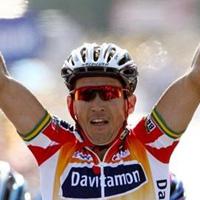
|
RMcE: First rest, and then just train my sprint. I don't need to do any more big training now, I am not going to get much fitter. So I will just sharpen up my sprint, ride a bit behind the motorbike, do my specific sprint training.
CN: Looking at your rivals, you have beaten Petacchi and Boonen and all the other names. How would you define yourself as a sprinter?
RMcE: I know what I have. I have pure speed over a short distance and, providing I am going well, if I can time it right and come from the right place, I can beat anyone. But if you compare me to Boonen or Petacchi, I can't sprint as fast for as long as they can, but I can maybe reach a higher peak speed for a short distance. I am an explosive sort of sprinter; they are more guys who wind it up and keep winding it and keep pounding all the way. Boonen will pound at all the way to the line and doesn't normally blow. Petacchi will take off and pretty much accelerate right all the way through the finish line.
CN: People talk about a McEwen corner, in other words a tight bend close to the finish, which seems to suit you well. But if you are instead up against those two guys on a long, straight, fast run into the finish, is it a question of being right on the wheel and picking the moment?
RMcE: Pretty much. Each time I have beaten those guys, it is pretty much the scenario that I will wait until they start their sprint and then try to accelerate out of the wheel. But I think I am also known for doing different things; like, if there are five sprints, I will maybe do three different things, just depending on what is happening around me because I might ride my sprint according to what either Alessandro or what Tom is doing, or somebody else who has a strong lead out train. If something else is going and I think that looks better, then I will change my tactic. I will do something different because I don't want to do the same thing every time…because when you're predictable, you're beatable.
CN: I remember reading in the past that you were saying that you didn't really like to have a train yourself….
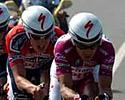
|
RMcE: I have never actually said that, people have said that for me (laughs). "He doesn't like a train." It would be great, but in our situation now with Cadel, we have what I wouldn't call a split team, but we have team that is built for two fronts. Our team is a luxury position with me, because I don't necessarily need a whole team built around me to be able to win the sprint. For me, it is an advantage not having to have one, but it is a disadvantage because I don't get one because they think I don't need one! So it is like a vicious circle. Maybe I am my own worst enemy, because I don't have a train and then I win… then they say, "he doesn't want one, he doesn't need one."
People often think that I'm there just am my own, but I use my team-mates in a different way. I will firstly get some of my team-mates to chase breaks, make sure firstly that we have a sprint - that is the most important thing. You can see in the last couple of years that we have taken a lot of responsibility in chasing breaks, doing more than our fair share of the work, which is more than can be said for some other teams. And then I use my other guys to place me where I need to be, so I just talk to them constantly, tell them what my tactic is and what I want to do. Then they put me where I need to be.
CN: Is that communication by radio?
RMcE: Now, I don't wear a radio. Or almost never. I only where it once or twice a year. The other guys all wear them, so if there is something to be said, there is always somebody near me that can tell me. I don't have enough room in my pockets - I need too much food!
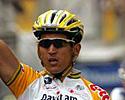
|
CN: I remember hearing last year that one of the Gerolsteiner riders did the Tour of Flanders with an Ipod instead of a race radio….
RMcE: (laughs). I didn't hear that…
CN: Not certain who it was, I think it was Heinrich Haussler. Anyway, the team was saying "do this, do that," but he was oblivious to it all. They didn't realise why until the end, because he was listening to music instead.
RMcE: (Laughs). An Ipod…it would have to be a young guy…
CN: What you think of the Tour route this year?
RMcE: I honestly haven't looked at it yet. I am going to look at it when I get home from here. I know basically where it goes, it starts in Strasbourg, then we had looked through Luxembourg, Valkenburg and Belgium, down to near Paris, out to the coast, down to the Pyrenees, up the climbs, and then it is suffering-time until we eventually reach Paris. I know where it sort of goes, but I couldn't say which stage the first time trial is, I don't know what day the first mountain stages, I don't know if there are stages between the mountains… it could be a sprint, I don't know.
CN: Is that a sign of confidence on your part, that you don't feel you need to know all the details?
RMcE: It is just that I have been to the Tour enough times to know that it is going to be prologue, sprints, time trial, maybe a sprint, mountains, breakaway, mountains, breakaway, sprint. It is a pretty stock-standard formula and for the details, I will look at it [the course outline] when I need to see it.
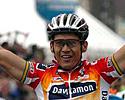
|
CN: Last year you had the tussle with O'Grady and lost the points that day. That was very early on in the Tour but you were saying at that point that the points jersey contest might be over for you. I think that shows how tight it can be, and how crucial every day is….
RMcE: I knew it, basically from the day I lost those points. I think without getting tangled up, I would have finished second on that day and it was 30 points. If you lose 30 points you can forget it. You might still finished second or third, but you're not going to win it anymore. That is, the green jersey competition has been closer and closer [for] the last few years. Since 2001, I think, it has been very, very close right up until the last day.
CN: Do you think going for the intermediate sprints is something which helps or not? Some guys don't go for them and choose to save all their energy for the end, while some other guys will chase all those points along the way.
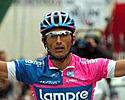
|
RMcE: It depends on how you feel. Hushovd started going for them from day one last year. I sort of did that in 2003, but actually that year in the Tour I just wasn't going all that great. I was all right, but not really good. I had also been going for those sprints and it can sap your energy a bit, if you are busy with those from the first day. There are three a day in the first week, so if you are trying to do those and then do the finish it is likely to take a bit of the edge off. I normally choose not to do them and just try to win stages. I want to be able to come away from the Tour and at least once, gone across the finish line with my arms in the air, rather than get to the end of it and maybe or maybe not have a jersey, but not actually won anything.
CN: If I remember right, Hushovd took just one stage last year…
RMcE: No, it was actually none. He won one the year before, 2004. I got three last year and two the year before.
CN: What is that feeling like, crossing the line with your arms in the air?
RMcE: That is the ultimate in the Tour. Okay, the ultimate is winning the yellow jersey, but the moment of winning the stage itself is just… it is unbelievable, that feeling crossing the line when you win the bunch sprint.
It is obviously satisfying if you win alone or win in the mountains, but winning a bunch sprint is like… you don't really know until the last few metres, and that is why it is so exciting to win a stage like that. I think it is the best and the most honourable way to go about winning the Green jersey. If you are winning stages you are getting the points… it just feels better.
CN: You said that it is in only in the last few metres that you know you are going to get the win. I am imagining how frustrating it must be like for Petacchi or Boonen, when they are doing this big, long sprint and you nip by the last few metres…
RMcE: Well, in the Tour stages that I have won, there aren't many where I have just come in the last couple of metres. I mean, I beat Boonen last year in the last 100 metres of stage five. I hit out from 200 [metres to go] in Karlsruhe on stage seven, and I passed my own team-mate Rodriguez with 100 metres to go in Montpellier, when he did an awesome lead out. It is not often when I just come in the last few metres.
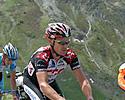
|
Sometimes I can't hold myself back… it is not like I will maybe only accelerate for 50 metres at high speed. I can do it for 180 metres, whereas other guys might go at the same speed for 200. I might be able to go just that point one quicker, but it is just enough. As long as I can come out of the wheel at 200 or 150 metres…it depends on how much room I get given.
CN: Alessandro [Petacchi] is obviously injured, so you think are the guys that you will be up against?
RMcE: The obvious - Boonen, Hushovd, Zabel, Freire…also Bennati, who is showing really good form here in the Tour de Suisse. He won the sprint today as well, coming past Boonen. After that, you have to start searching a bit, I think.
CN: So you still consider Zabel a threat... he doesn't seem to win as much as before, but he is still usually placed pretty well in bunch sprints.
RMcE: He is somebody who is always in position. He always puts himself in a position where if he had the legs, he could win. He has still got that sense of positioning and the experience, so even if he is not quite as fast as he was a few years ago, he still does everything else just as well as he used to. And that makes him dangerous. The worst thing you can do is underestimate somebody. That is something I try not to do.
CN: I guess this year he will have, for the first time in a long time, a train and a team dedicated to him.
RMcE: Yes, it depends on how they set it up and who goes… are they still as good as the Quick.Step train? We will only know when it starts.
CN: What do you feel coming up to the Tour - do you feel pressure, or are you looking forward to do it?

|
RMcE: Well, looking forward to the Tour is maybe not the right way to put it. It is not the most fun race, because there is pressure, it is just really busy and you haven't got a second to yourself. From the moment you wake up in the morning until the time you go to bed, it just seems that you are constantly just flat-out, busy. You feel pressure and there is expectation from the team, but mostly just from yourself. That is what I have… I am going there having trained hard and suffered in the Tour of Switzerland to be good at the Tour, and so I will be wanting to win a stage and nothing less. If I come away with less than a stage win, I will be disappointed. That is normal. So you do put pressure on yourself
CN: But I suppose that pressure does in turn cause the elation, when you do hit the line with your arms in the air.
RMcE: Yes, that is true. You realise at that one moment that is has all been worth it.
CN: What is your plan after the Tour?
RMcE: I will ride some crits, take is easy, try and recover a bit from the Tour. Maybe some of the Vuelta, but I will reserve that decision until after the Tour.
CN: What is your situation with a contract?
RMcE: I am on contract until the end of 2008, so I have nothing else to think about. That's good.
CN: You were saying that things are pretty balanced on the team, with you having some guys and Cadel having other guys to help him. I guess perhaps that shares the pressure as well, so not everything rests on you…
RMcE: Yes, although I do think that if I do well, it takes the pressure is off the team in general. But Cadel will have his own pressure on himself and vice versa. If the mountains were first and Cadel was leading the Tour, I would still be wanting to win a stage.
At the moment we are busy trying to reinforce the team a little bit, with Cadel looking for one or two to support him within the team. I am looking for one or two can support me in my role as well.
CN: What about the overall for the Tour? [Editors note: this interview was conducted before Jan Ullrich and Ivan Basso were ejected from the race]
RMcE: I am tipping Ullrich. I have been saying that since the Tour of Romandie. That is the first time anybody saw him, that was his first race this season. He was in the gruppetto with me but I was looking at his heart rate monitor and the gear he was riding compared to the hill we were on. It was only the end of April and I know how good he gets and how quick he builds form… he wasn't going above 160 bpm and he was riding the big ring up this climb. I was panting like mad, but he was fairly comfortable. He was still a few kilos overweight and it was his first race, so that was something.
CN: How did he look here in the Tour de Suisse?
RMcE: Well, I didn't [see] anything of him in the mountains, of course (laughs), I am not there long enough in the bunch, but I have seen enough and heard enough from a few others to know that he is going really well and is only going to keep getting better. So he is my tip for the Tour. I think that even if Basso manages to drop him, he is going to be able to limit his losses and I think is going to be incredible in the time trials. This year there is a lot of time trials…I have been told there are two and they are flattish, a bit up and down. There is no Alpe d'Huez time trial and there is no team time trial, but there are two long individuals. So that is in Ullrich's favour. Especially if you look at the last time trial last year, he took a minute and a half out of Basso. I think it will be good battle, normally it should be between those two. But you could also have somebody else who pops up, that can always happen.

